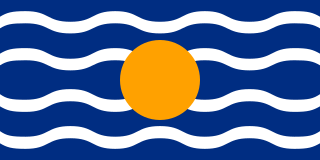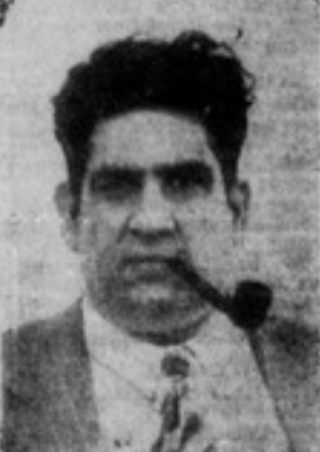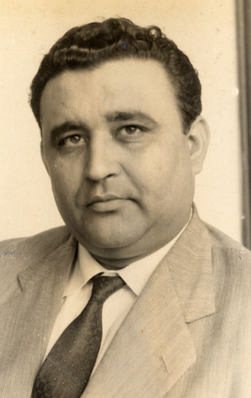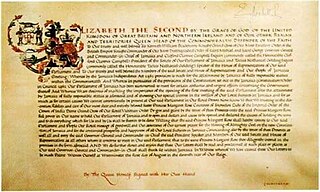
Eric Eustace Williams was a Trinidad and Tobago politician. He has been described as the "Father of the Nation", having led the then British Colony of Trinidad and Tobago to majority rule on 28 October 1956, to independence on 31 August 1962, and republic status on 1 August 1976, leading an unbroken string of general elections victories with his political party, the People's National Movement, until his death in 1981. He was the first Prime Minister of Trinidad and Tobago and also a Caribbean historian, especially for his book entitled Capitalism and Slavery.

The People's National Party (PNP) is a social-democratic political party in Jamaica, founded in 1938 by Norman Washington Manley who served as party president until his death in 1969. It holds 14 of the 63 seats in the House of Representatives, as 96 of the 227 local government divisions. The party is democratic socialist by constitution.

The West Indies Federation, also known as the West Indies, the Federation of the West Indies or the West Indian Federation, was a short-lived political union that existed from 3 January 1958 to 31 May 1962. Various islands in the Caribbean that were part of the British Empire, including Trinidad and Tobago, Barbados, Jamaica, and those on the Leeward and Windward Islands, came together to form the Federation, with its capital in Port of Spain, Trinidad and Tobago. The expressed intention of the Federation was to create a political unit that would become independent from Britain as a single state — possibly similar to Canada, the Federation of Australia, or the Federation of Rhodesia and Nyasaland. Before that could happen, the Federation collapsed due to internal political conflicts over how it would be governed or function viably. The formation of a West Indian Federation was encouraged by the United Kingdom, but also requested by pan-Caribbean nationalists.

Sir William Alexander Clarke Bustamante was a Jamaican politician and labour leader, who, in 1962, became the first prime minister of Jamaica.
The Jamaica Labour Party is one of the two major political parties in Jamaica, the other being the People's National Party (PNP). While its name might suggest that it is a social democratic party, the JLP is actually a conservative party.

Sir Grantley Herbert Adams, CMG, QC was a Barbadian politician. He served as the inaugural premier of Barbados from 1953 to 1958 and then became the first and only prime minister of the West Indies Federation from 1958 to 1962. He was a founder of the Barbados Labour Party (BLP), and he was named in 1998 as one of the National Heroes of Barbados.

The Democratic Labour Party was the main opposition party in Trinidad and Tobago from 1957 till 1976. That party was the party which opposed the People's National Movement (PNM) at the time of Independence. After several splits brought about by leadership struggles, the party lost its hold on the Indo-Trinidadian community in the 1976 General Elections and was displaced in parliament by the United Labour Front under the leadership of Basdeo Panday, a former DLP senator. The party was the representative of the ethnic Indian community in the country; however Indian Muslims and Christians were said to be less loyal to the party than Indian Hindus.

Bhadase Sagan Maraj was a Trinidadian and Tobagonian politician, Hindu leader, civil rights activist, trade unionist, landowner, businessman, philanthropist, wrestler, and writer. He founded the Sanatan Dharma Maha Sabha in 1952, which grew to be the largest and most influential Hindu organization in Trinidad and Tobago and the wider Caribbean. He also founded the Caroni East Indian Association, the People's Democratic Party, the Democratic Labour Party, the Democratic Liberation Party, the Federation of Unions of Sugar Workers and Cane Farmers, and The Bomb newspaper.
The Sanatan Dharma Maha Sabha (SDMS), pronounced[sənɑːt̪ənəd̪ʰərməməɦɑːsəbʰɑː], colloquially known as the Maha Sabha, is the largest and most influential Hindu organization in Trinidad and Tobago. It operates 150 mandirs, over 50 schools, and has its own radio station, Radio Jaagriti 102.7 FM, and TV channel, TV Jaagriti. They also operate the Indian Caribbean Museum of Trinidad and Tobago. It was formed in 1952 when Bhadase Sagan Maraj engineered the merger of the Sanatan Dharma Association and the Sanatan Dharma Board of Control. An affiliated group, the Pundits' Parishad, has 200 affiliated pundits. The organisation's headquarters are located in St. Augustine.
The West Indies Federal Labour Party (WIFLP) or Federalists was one of two main Federal parties in the short-lived West Indies Federation, the other being the West Indies Democratic Labour Party (DLP) or Democrats. The party was the first national party of the planned West Indies Federation. In the 1958 West Indies federal elections, the party was victorious, winning 25 of the 45 seats in the Federal Parliament of the West Indies Federation.

Albert Maria Gomes was a Trinidadian unionist, politician, and writer of Portuguese descent, was the first Chief Minister of Trinidad and Tobago. He was the founder of the Political Progress Groups and later led the Party of Political Progress Groups. He was active in the formation of the Democratic Labour Party (DLP) in Trinidad and Tobago and played a role in forcing Sir Alexander Bustamante out of the Federal Democratic Labour Party. Gomes briefly led DLP in 1963 when factions loyal to briefly ousted Rudranath Capildeo after Capildeo left Trinidad and Tobago to take up a position at the University of London. However, the rank and file of the party stood behind Capildeo, and Gomes left the party.

Simbhoonath Capildeo was a prominent lawyer and politician in Trinidad and Tobago. He was the elder brother of Rudranath Capildeo and uncle of Nobel laureate Sir Vidia "V. S." Naipaul and Shiva Naipaul. He was father to two sons, Surendranath and Devendranath Capildeo and a daughter, Sita Capildeo. Capildeo was one of the founding members of the Democratic Labour Party and a member of parliament from 1956 to 1966, becoming known as "the Lion of the Legislative Council". He served as the acting Leader of the Opposition for Bhadase Sagan Maraj and Rudranath Capildeo. Capildeo was also an important leader of the Hindu community in Trinidad and played in role in the foundation of the Sanatan Dharma Maha Sabha. In 1989 he was awarded the Chaconia Gold Medal by the Trinidad and Tobago government, honoring his service to the country.

The People's Democratic Party was a political party in Trinidad and Tobago formed in 1953. Under the leadership of Bhadase Sagan Maraj it contested the 1956 General Elections, capturing 5 of 24 elected seats in the Legislative Council and 20.3% of the vote. In 1957 it joined the Federal Democratic Labour Party and later co-founded the Trinidad and Tobago Democratic Labour Party, together with the Trinidad Labour Party and the Party of Political Progress Groups.
Maraj, Maharaj, Maharajh, Maragh, or Maharagh is a Hindu Indian surname derived from the Sanskrit word Maharaja meaning "great leader", "great ruler", or "great king". Originally used as an honorific suffix to a Hindu priest's name, it became the surname of many Hindu priests who immigrated to different European colonies during the Indian indenture system and their descendants because when stating their names to the respective local colonial authorities they would state their whole name and many would include the honorific suffix of Maharaj, which the authorities erroneously documented as their surname. Notable individuals bearing the surname include:
George F. Fitzpatrick (1875–1920) was a prominent barrister of Indian descent and member of Trinidad & Tobago's Legislative Council. He played an early role in helping bring to light malpractices carried out under the system of Indian indentured labour. In 1909, George Fitzpatrick provided testimony before a British parliamentary investigation, led by Lord Sanderson, regarding alleged mistreatment of East Indian labourers living in Trinidad. The Sanderson Committee, however, failed to bring about the immediate abolition of the indentured system, only its postponement, which was further deferred by the onset of the First World War. It was not until January 2, 1920, that the system of indentured labour would come to an end. George F. Fitzpatrick's son, Hon. George Fitzpatrick, trained as a solicitor and served a three-year term as member of parliament, representing the district of San Fernando. Following the death of his first wife during childbirth, Hon. George Fitzpatrick married Phyllis Sinanan, sister of Mitra and Ashford Sinanan, uniting the Fitzpatrick family with another prominent political family of Trinidad (see Ashford Sinanan, Ambassador, Leader of the Opposition, Democratic Labour Party, West Indies Federation, founder of the West Indian National Party and High Commissioner to India. See also M. Sinanan, Constitution Commission of Trinidad and Tobago, presented to His Excellency Sir Ellis Clarke, Commander-in-Chief of Trinidad and Tobago, January 22, 1974.

Ashford Sastri Sinanan was a politician from Trinidad and Tobago who served in various roles prior to and following Trinidad and Tobago’s independence in 1962. Along with his brother, Mitra, Sinanan helped draft portions of Trinidad’s constitution and later went on to serve as the country’s first High Commissioner to India. High office, however, ultimately eluded him: first, in his 1958 bid to become the first Prime Minister of the Federation of the West Indies, a contest that he narrowly lost by 2 seats to Barbados’ Sir Grantley Adams; and second, in 1974, when he resigned from his post as High Commissioner to India to found the West Indian National Party (WINP). The WINP ultimately failed to break the 20-year rule of then Prime Minister, Eric Williams.
The West Indian National Party was a political party in Trinidad and Tobago. It was originally founded on 18 November 1942 as a progressive party, aligned with the socialist views of trade unionists Quintin O'Connor and Rupert Gittens of Trade Union Congress. One of the key planks of their platform was the nationalisation of major industries. In 1945 Claude Lushington attended the Pan-African Congress in Manchester on behalf of the party.

The Colony of Jamaica gained independence from the United Kingdom on 6 August 1962. In Jamaica, this date is celebrated as Independence Day, a national holiday.

Federal elections were held in the West Indies Federation for the first and only time on 25 March 1958. The result was a victory for the West Indies Federal Labour Party, which won 25 of the 45 seats in the House of Representatives.












